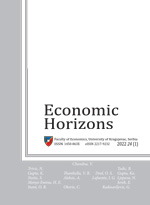INCOME CONVERGENCE IN THE PROCESS OF THE WESTERN BALKAN STATES’ ACCESSION TO THE EUROPEAN UNION
Nenad Stanisic
Faculty of Economics, University of Kragujevac, Kragujevac, The Republic of Serbia
One of the main expectations in European transition economies is that the processes of building the market economy and European integrations lead to a significant increase in the living standard, as well as to catching up with the level of the income per capita achieved in developed European economies. A quarter century after the beginning of transition, many of the former socialist countries joined the EU and significantly increased their GDP per capita. On the other hand, transition in the countries of the so-called Western Balkans has disappointed in this sense. The paper tests the existence and speed of income convergence in the Western Balkan states and developed EU countries, in comparison with the so-called „New Member States”. The results indicate that, despite the achieved income convergence in the pre-crisis years, the outbreak of the global economic crisis has revealed many structural and reform problems that the countries of the region have been facing for a long time. Catching up with developed EU members’ average GDP per capita stopped in the Western Balkan states after the beginning of the crisis, with a simultaneous increase in the income gap between the Western Balkan states and the new EU member states.
Keywords: income convergence, economic development, the Western Balkans economies, European economic integrations
JEL Classification: O47, P27, F43
Economic Horizons, 2016, Vol. 18, No 1, pp. 3-15; Published online 25 April 2016; doi:10.5937/ekonhor1601003S




